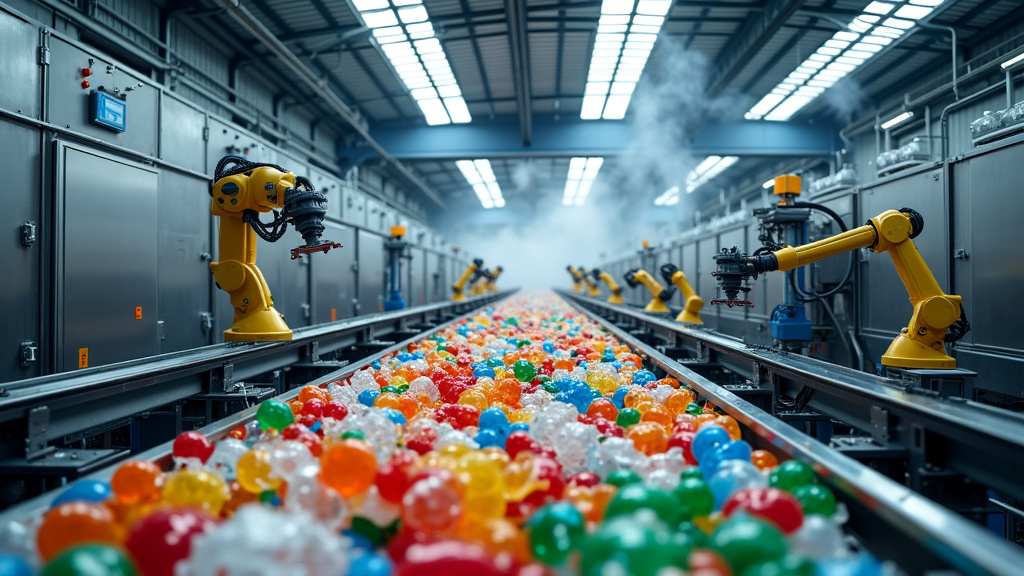5901 Botham Jean Blvd, Dallas, TX 75215
Introduction to Advanced Rare Metal Recycling Technologies
February 21, 2025Over 50 million tons of electronic waste are generated globally each year, containing billions of dollars worth of rare earth elements. This highlights the urgent need for sustainable solutions in our tech-driven world. Advanced rare metal recycling technologies offer a transformative approach to managing these critical resources.
These innovative recycling methods have become essential tools for sustainability. By recovering and reusing rare earth elements from discarded electronics and industrial waste, they reduce dependency on environmentally harmful mining practices and support a more circular economy.
The impact of these technologies goes beyond resource conservation. By minimizing the need for primary extraction, advanced recycling significantly reduces the environmental footprint of rare earth production. According to the American Chemical Society, recycling these elements can use up to 92% less energy than mining, leading to lower greenhouse gas emissions and less ecological disruption.
Beyond environmental benefits, advanced rare metal recycling technologies also drive economic growth. They create jobs in the green tech sector, foster innovation in materials science, and help stabilize the volatile rare earth element market. As geopolitical tensions threaten traditional supply chains, these methods offer greater resource security and independence.
Innovations in Rare Metal Recovery Techniques

As technology advances, the demand for rare metals continues to rise. However, extracting these valuable materials from complex waste streams poses significant environmental and economic challenges. Fortunately, researchers and engineers have developed several innovative recycling methods transforming metal recovery.
One of the most promising innovations is bioleaching, a process that uses microorganisms to extract metals from ore and waste. Unlike traditional extraction methods that rely on harsh chemicals and energy-intensive processes, bioleaching offers a more environmentally friendly alternative that is both efficient and cost-effective.
Imagine billions of microscopic miners working tirelessly to separate valuable metals from waste—that is essentially what happens during bioleaching. Certain species of bacteria, such as Acidithiobacillus ferrooxidans, can oxidize sulfide minerals and generate acidic conditions that dissolve metal compounds. As the bacteria process the waste, they release the desired metals into solution, where they can be easily collected.
Bioleaching is particularly effective for recovering metals from complex waste streams that are challenging to process using conventional techniques. For example, recent studies have shown promising results using bioleaching to extract rare earth elements from electronic waste, mine tailings, and industrial sludge.
Advantages of Bioleaching Over Traditional Methods
- Lower environmental impact—uses naturally occurring microorganisms instead of harsh chemicals
- Reduced energy consumption—operates at ambient temperatures
- Cost-effective—requires minimal infrastructure and operational expenses
- Ability to process low-grade ores and complex waste streams
- Potential for in-situ application in mines, reducing the need for ore transportation
While bioleaching shows immense promise, researchers continue to explore other innovative metal recovery techniques as well. These include advanced hydrometallurgical processes, electrochemical recovery systems, and even the use of engineered plants to extract metals from contaminated soils—a process known as phytomining.
As global demand for rare metals grows, these sustainable recovery methods will play an increasingly crucial role in meeting demand while minimizing environmental impacts. By turning to nature for inspiration, scientists are discovering new ways to recycle and reuse the valuable resources hidden in our waste streams.
| Aspect | Traditional Methods | Bioleaching |
|---|---|---|
| Process | Large-scale excavation, crushing, smelting, chemical leaching | Uses microorganisms to dissolve metals |
| Environmental Impact | High energy consumption, pollution, habitat destruction | Lower energy use, minimal pollution, less habitat disruption |
| Efficiency | Effective for high-grade ores | Effective for low-grade ores and waste |
| Temperature | High temperatures required | Operates at ambient temperatures |
| Chemical Use | Relies on harsh chemicals | Minimizes need for aggressive chemicals |
Economic and Environmental Benefits of Advanced Recycling

Advanced recycling technologies are transforming waste management and resource recovery. These processes offer economic and environmental benefits, pushing industries toward a sustainable, circular economy.
Economically, advanced recycling creates growth opportunities and optimizes resources. By converting previously unrecyclable materials into valuable feedstocks, these technologies generate new revenue streams. For example, chemical recycling processes can transform plastic waste into raw materials for new plastics and chemicals, reducing reliance on virgin resources and fostering a circular supply chain.
The environmental benefits are equally significant. By diverting waste from landfills, these technologies reduce pollution and greenhouse gas emissions. A study by the American Chemistry Council found that advanced recycling methods can decrease CO2 emissions by over 100% compared to landfilling, highlighting their potential to combat climate change.
Driving the Circular Economy
Advanced recycling is key to transitioning to a circular economy. By keeping materials in use longer and reducing waste, these technologies help complete production cycles. This shift conserves resources and minimizes environmental impact throughout the product lifecycle.
The circular economy model enabled by advanced recycling offers several advantages:
- Reduced dependence on finite raw materials
- Lower energy consumption in manufacturing
- Less waste sent to landfills
- Creation of new jobs in recycling and remanufacturing
- Improved resource efficiency across industries
Economic Growth through Resource Recovery
Advanced recycling drives economic growth by optimizing resource recovery. These processes extract maximum value from waste materials, creating a new market for recycled content and spurring innovation in product design and manufacturing.
For instance, chemical recycling of mixed plastics can produce high-quality recycled polymers for food-grade packaging. This reduces waste and meets the growing demand for sustainable packaging, creating new business opportunities.
Environmental Impact Reduction
The environmental benefits extend beyond waste reduction. These technologies contribute to:
- Lower greenhouse gas emissions compared to traditional methods
- Reduced reliance on fossil fuels for raw materials
- Decreased water pollution from landfill leachate
- Conservation of natural habitats by minimizing resource extraction
By addressing these environmental challenges, advanced recycling helps industries meet sustainability goals and comply with increasingly stringent regulations.
Challenges and Future Outlook
While promising, challenges remain for advanced recycling. High initial costs, technological complexities, and the need for consistent feedstock quality pose hurdles to widespread adoption. However, ongoing research and development are addressing these issues, promising more efficient and cost-effective solutions.
As industries and governments recognize the benefits of advanced recycling, we can expect greater investment and innovation. The continued development of these technologies will be crucial in building a sustainable, circular economy that balances economic growth with environmental stewardship.
| Aspect | Traditional Recycling | Advanced Recycling |
|---|---|---|
| Process | Mechanical sorting and reprocessing | Technologies like pyrolysis, gasification, solvolysis |
| Materials Accepted | Primarily plastics 1-5 | Plastics 1-7, including contaminated plastics |
| Energy Use | Less energy-intensive | Can reduce fossil energy use by up to 97% compared to landfilling |
| Environmental Impact | Lower greenhouse gas emissions | Reduces global warming potential, decreases CO2 emissions compared to landfilling |
| Output Quality | Downcycled to products of lesser quality | Produces virgin-like quality resins |
| Public Support | 58% strong support | 65% strong support |
Challenges in Implementing Advanced Recycling Systems
While advanced recycling technologies offer promising solutions for waste management, several significant obstacles impede their widespread adoption. High initial costs, infrastructure gaps, and limited public awareness pose substantial hurdles that must be overcome to realize the full potential of these systems.
The financial barrier is a formidable challenge for many communities and businesses looking to implement advanced recycling technologies. Upfront investments in specialized equipment and facilities can be prohibitively expensive, especially for smaller municipalities or companies with limited resources. This cost factor often deters potential adopters, even when long-term benefits are clear.
Compounding the financial challenge is the widespread lack of suitable infrastructure to support advanced recycling systems. Many regions lack the necessary facilities, transportation networks, or processing capabilities. Developing this infrastructure requires significant time, planning, and capital investment, resources that are often in short supply.
The Public Awareness Predicament
Equally challenging is the limited public awareness and understanding of advanced recycling technologies. Many people remain unfamiliar with these methods and their potential benefits. This knowledge gap can lead to skepticism, reduced participation, and ultimately, lower adoption rates.
Education plays a crucial role in addressing this challenge. Effective awareness campaigns are needed to inform the public about the advantages of advanced recycling and how individuals can contribute to its success. Without widespread buy-in from communities, even the most sophisticated recycling systems may struggle to achieve their intended impact.
Overcoming Implementation Barriers
Despite these obstacles, innovative solutions are emerging to tackle the challenges of implementing advanced recycling systems:
- Public-private partnerships can help distribute costs and share expertise, making advanced recycling more financially feasible for communities.
- Phased implementation approaches allow for gradual infrastructure development, spreading out expenses over time.
- Leveraging technology, such as AI and IoT devices, can optimize existing systems and improve efficiency, potentially reducing overall costs.
- Targeted education initiatives, including school programs and community workshops, can boost public awareness and engagement.
By addressing these implementation challenges head-on, we can pave the way for more widespread adoption of advanced recycling technologies. This shift has the potential to dramatically reduce waste, conserve resources, and move us closer to a truly circular economy.
No table output available
Conclusion on the Role of Advanced Rare Metal Recycling Technologies

Advanced recycling technologies are essential for a sustainable future, and Okon Recycling is leading the way in transforming resource management. Their innovative processes recover rare metals, reducing reliance on harmful mining while conserving resources and minimizing environmental impact.
Okon’s cutting-edge facility in Dallas is redefining waste management, giving new life to materials like construction chillers, industrial magnets, and specialty metals. These efforts drive a circular economy, cut carbon emissions, and create new economic opportunities.
The future of sustainability depends on innovation and action. Businesses and individuals can make a difference by choosing responsible recycling solutions. Partner with Okon Recycling for expert waste management that supports both industry and the environment. Contact us at 214-717-4083 to explore sustainable solutions for your recycling needs.
